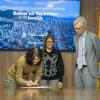Bogota through the District Secretariat of Habitat participated as a panelist of the webinar Learning from tactical urbanism: metropolitan perspectives for long-term solutions, driven by the global network metropolis®, a platform that connects, shares and mobilizes experiences in the face of local and global challenges faced by subnational governments and of which Bogotá, head of Mayor Claudia López, will be president from June 2022 to December 2023.
"#TacticalUrbanism is not only about street pacification but also an opportunity to redefine public space, especially in relation to street violence against women."@nadyamrangel, Secretary of @habitatbogotapic.twitter.com/jxEUjloQl1
— Metropolis (@metropolis_org) January 28, 2021
The webinar was attended by experts in urban planning and habitat issues in Brussels, Barcelona, San Salvador and Bogotá, that analyzed the challenges imposed by the COVID-19 pandemic in public spaces and the strategies that have led to the development of various initiatives such as new pedestrian spaces, prioritization of bicycle use and physical distance schemes, under a vision of tactical urbanism.
The activity was carried out virtually on 28 January 2021, with the moderation of Octavi de la Varga, metropolis® Secretary General who guided the participants' dialogue around the socio-economic learnings of the pandemic such as sources of funding, short-term initiatives in tactical urban planning projects and their durability over time and their successful experiences applicable in multiple urban environments.
In this sense, the city of Bogotá reaffirmed its commitment to advance the implementation of a New Social and Environmental Contract, which, in the face of the adversities of the pandemic, continues to promote more inclusive, flexible, secure, sustainable and healthy citizen environments, taking advantage of spaces of international articulation that bring together pluralistic and participatory perspectives.
Today @habitatbogota participated in the webinar "Learning from tactical urbanism: metropolitan perspectives for long-term solutions", developed by @metropolis_org where experiences on tactical urbanism solutions were shared and learned about. #CuidemosABogotápic.twitter.com/XDgEIuFJia
— Relaciones Internacionales Bogotá (@BogotaInter_nal) January 28, 2021
To read this note in spanish, click here.






